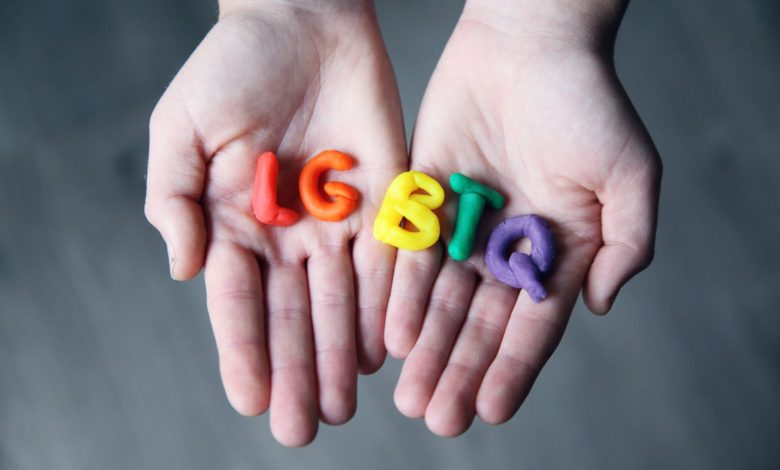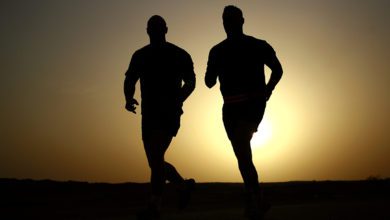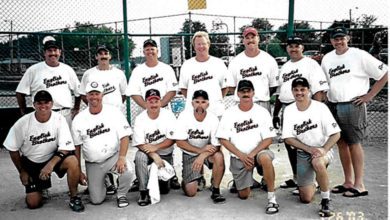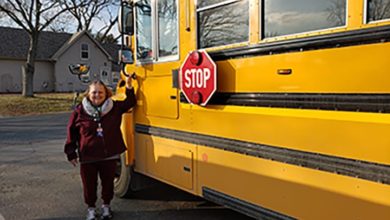Uniting Pride provides community, celebration for LBGTQIA+ community

Every human needs a place to belong.
And yet, throughout all of time, groups of people have been separated from the whole, been made to feel as though they are less than, and even, many times, intimidated to be who they were born to be.
The Mahomet-Seymour community felt a glimpse of this in September of 2021, when students of the LBGTQIA+ community were singled out during homecoming week, enduring slanderous comments and even assaulted. Their story, which reached more than 13,000 readers, caught the attention of Uniting Pride (UP) of Champaign County.
Almost immediately, UP reached out to the LBGTQIA+ students in the Mahomet-Seymour community, letting them know that they were valued. Students at Mahomet-Seymour were asked to join UP in the Champaign-Urbana Pride parade.
But UP knew the LBGTQIA+ students needed more than just a few hours to celebrate who they are. The organization wanted to help make Mahomet-Seymour a more inclusive and safe community for all students. They offered the Mahomet-Seymour schools free training for teachers and students.
The success of their student training is evident. When parents of a middle school-aged student in Champaign reached out to UP about their child being severely bullied at school, UP reached out to Unit 4 administrators, asking if they could help. Trained members came to the middle school, getting to touch the ear of every student in that grade over six days with questions to help grow empathy.
“We ask them to take a moment and think about a time when someone made them feel bad,” Uniting Pride of Champaign County Director of Operations Nicole Frydman said. “A time when they were made fun of or put down or insulted. It could be around any number of things: it could be around their body; it could be around how they do in school; it could be around their race or their religion, or their hobbies or interests, whatever it might be.
“But take a moment and think about how it made you feel when someone put you down in that way. Do you really want to be the reason why other kids feel that badly? Do you really want to be the source of someone else’s pain in that same way?”
When you reframe the conversation like that, kids suddenly start to realize, ‘Whoa, I felt terrible when that happened to me. I really don’t want to be the reason why other kids feel that way.’
“And then. we talk to them about what it is to misgender someone or to deadname them or to use slurs,” Frydman said. “If you are not that targeted group, you don’t think it’s that big of a deal. But when we reframe the conversation, we talk to kids about how it’s making other kids feel and can draw that direct connection to how badly they felt, kids get it.”
Since the training has been completed, the middle school student has not been bullied.
“The family of the kid who was particularly targeted has reported zero incidents of bullying since that training,” Frydman said. “When you see an impact like that in real-time, so fast, it works.
“That’s joy, that’s progress. That’s why we do what we do.”
Similar training was not an option in Mahomet-Seymour. Frydman reported that the school administration turned it down. Since then, representatives from UP have consistently shown up at Mahomet-Seymour School Board meetings to share staggering statistics of how children within the LBGTQIA+ community struggle.
According to statistics provided through The Trevor Project, suicide is the second leading cause of death among young people aged 10 to 24, and LGBTQ youth are more than four times as likely to attempt suicide than their peers. A 2021 report on LBGTQ Mental Health found that 42-percent of LGBTQ youth seriously considered attempting suicide in the past year, including more than half of transgender and nonbinary youth.
Yet, the teens are not considering or committing suicide because of their sexual orientation or identity, but rather because of negative treatment, such as bullying, from their peers.
Frydman said those numbers change when LBGTQIA+ youth have supportive adults in their lives.
“The numbers just drop significantly around risk and mental health issues,” she said. “In any way that community organizations, such as schools, can do more on that without needing formal structural change at the top levels is great. All the GSAs (Gay-Straight Alliance) that exist in the schools, the after-school programs that are supportive, all that stuff is amazing.”
Mahomet-Seymour High School has had a GSA club for a few years, and one also became available to students at the Junior High this year.
Just like the UP training teaches students that what they say or do to their peers, whether it’s based on sexual orientation, gender, race, disability, academic progress, or what a child is interested in, the GSA programs can also teach kids about how to be allies for their peers.
Frydman said that when community leaders stand up, a cultural shift within any community is lasting.
In the January Mahomet-Seymour School Board meeting, Frydman watched board member Meghan Hennesy try to take that step by proposing a vote on a Diversity and Inclusion Committee within the Mahomet-Seymour School District. The committee was voted down for the third time since 2020.
“It’s about a whole host of issues and would serve a huge swath of the community. And we can’t get there,” Frydman said. “Without community leaders, standing up and saying this shift is important: it deserves our time, it deserves our energy, it deserves conversation, it deserves priority, It’s going to be very difficult to make a substantial cultural shift. That doesn’t mean don’t continue to do the work. Don’t continue to push. Keep going with that. Vote. Let’s have it voted down 6,789 times. That’s how you shift things.”
Whether or not that shift comes, UP continues to be committed to providing a space and resources for members of the LBGTQIA+ community to belong.
Founded in 2009 as an organization run by volunteers, UP began as a celebration of the LBGTQIA+ community. They kicked off the Champaign-Urbana Pride parade, which has grown annually. But now, in 2022, the organization also focuses on making sure LBGTQIA+ teens in Champaign County have a prom where they feel comfortable just being themselves and continues to host trainings for businesses, schools, and non-profits within Champaign County.
“Pretty much anyone who asks and we can tailor those educational sessions to the needs of whatever group asks us to,” she said.
Just like coming to Mahomet-Seymour, UP also focuses on advocacy work, even at the state level, working towards policy that ensures freedom for the LBGTQIA+ community and educational opportunities and representation for all residents.
But their bread and butter is support groups and playgroups for all ages.
“It’s amazing to see the community helping each other and reaching out and supporting each other,” Frydman said.
Even during the pandemic, especially the first year when getting together was very limited, UP saw how access to their support groups through an online platform provided more opportunities for teens to find a safe space.
“We’ve got youth from all over the county who participate in our support groups, and some of our programming because it’s online and it’s very easy for them to be involved with,” Frydman said.
The benefit of these groups isn’t just that these students meet other students like them, but that they are connected with a network. Children who may feel alone in whatever situation or location they are in can be reminded that the world is bigger than what is in their backyard.
“When you’re a kid, the school you go to and who your parents spend time with and whatever your faith group is, those aren’t your choices, right? But as an adult, you start to make choices about how you move through the world. Which group of people do you spend your time with? Which faith group do you work with? Which organizations do you volunteer with or spend your time with? And so it’s incredible to see how the community comes together,” Frydman said.
Being able to come together in public is something the LBGTQIA+ community has fought for.
“There are so many people who don’t understand the origins of the pride movement,” she said.
“It was essentially illegal to be gay in public. And people decided to start an uprising against that and to say, ‘No. We’re here, we’re queer. Get used to it.’ We exist and it should be okay to exist out and proud in public in our communities. And every time we do a public event, that is what we’re reaffirming. We are saying, ‘We deserve to live our lives in public, in our communities, without shame, without harassment, without having to hide some portion of our lives or our families.’”
This is what Pride brings for the LBGTQIA+ community each year.
Of course, with COVID in the background, that celebration has been questionable over the last two years. But Frydman said with 98-percent of the LBGTQIA+ community vaccinated against COVID-19, the 2021 Pride parade was possible with a few additional mitigations.
“There’s nothing that can fill the need like gathering out and publicly in your community can,” she said. “There’s nothing else that can do it. So the more we can get back to that, the more we can find safe ways to do that.”
Having those public events helps both current residents and newcomers to Champaign County know that this is where to connect, to find that place where one can belong.
Uniting Pride will host a cabaret show filled with love songs at The Celebration Company at the Station Theatre on Feb. 11 from 8:30 to 10:30 p.m. Virtual tickets are also available for this fundraiser.
The group is also keeping its eyes on COVID-19 numbers in hopes of having a 2022 Queer Prom. Keep your eyes on https://www.facebook.com/UPCenter for details. For more information regarding anything with the UP Center, visit https://www.unitingpride.org/.




